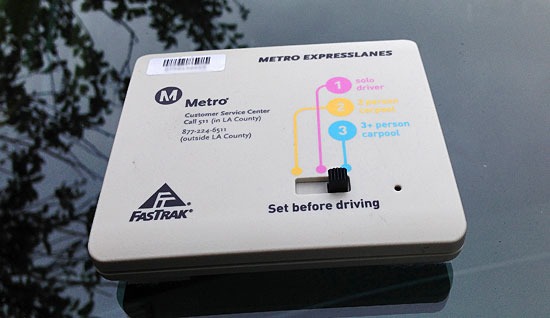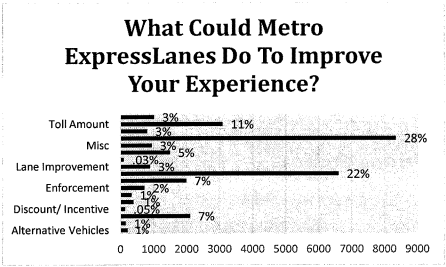
(Note: According to The Source, I misunderstood the wording of the motion. An earlier version of this article mentioned that staff opposed extending the transponder fee. Apparently they wish to see it extended through the end of the ExpressLanes pilot in February 2014)
Metro's two staff reports to the Board of Directors on the progress of the ExpressLanes pilot program is full of good news. Over the last five months, there has been a 41% increase in transponder sales in L.A. County. The lanes will generate between $16 million and $19 million for investment in the corridors along the I-10 and I-110 in addition to the funding provided by the FTA for the experiment.

However, more and more people are holding FastTrak accounts that aren't regular users. The number of LA County accounts with infrequent trips increased by 71% from 49,759 to 85,102; the number of accounts with zero trips increased by 103% from 22,053 to 44,767.
The reason the Metro report is only reporting on accounts held within L.A. County is because transponder fees for L.A. County residents purchased through Metro were waived by a Board Action from the April meeting. The holiday from fees is only a six month experiment.
Originally, the ExpressLanes program included a small monthly "maintenance fee" for people that owned transponders and had active accounts but weren't using the lanes more than a couple of times a month. Following a media uproar (note: Streetsblog covered it first), the Metro Board decided to waive the fee for six months as a pilot program within the pilot program. Basically, if you didn't use the lanes in some form, you had to pay a $3 maintenance fee.,
Supervisor Zev Yaroslavsky sits on the Metro Board of Directors and wants to permanently end the transponder fee for accounts that don't use the ExpressLanes system (or don't have their transponder account and TAP account linked together). Metro staff agree that the positives outweigh the negatives, at least for now.
The report that provides the above statistics also recommends letting the maintenance fee return at the end of the trial period. Metro pays a maintenance fee of $3 per month to as part of its contract with FasTrak, the company managing the program. If Metro continues to waive the fee, the agency will have to pay FasTrak $1.5 million more out of another coffers. With net revenue estimated between $16 million and $19 million, that is nearly 10% of the net revenue.
Metro staff also claims that the transponders are not a barrier into entering the ExpressLanes system.
A recent survey of existing FasTrak customers also illustrates that the maintenance fee is not a deterrent to opening an account. Of the 5% of customers who cited maintenance fee 74% are 110 users.
The findings of Metro's study is something of a surprise. Environmentalists and transportation reform advocates who back the concept of congestion pricing worried that a transponder requirement for carpools would reduce carpooling in Southern California. Adding a maintenance fee on top of the requirement to own the transponder would be doubly onerous.
Of course, the survey is of people who are already FasTrak users, not people who are not or are considering becoming account holders. People who already own an account have either made the decision to live with the fee or
But regardless of the survey, Yaroslavsky is more impressed with the decline in complaints on the hotline since the maintenance fee was reduced and especially the increased participation in the program.
"More revenue coming in, more people are participating. (The waiver of the fee) Got the program to where we wanted it to be," said Vivian Rescalvo, Yaroslavsky's long-standing transportation deputy. "We should permanently waive the fee so even more people will use it to get on the fast track in Southern California."
The issue will be decided at the Metro Board meeting this Thursday morning. If the Board the maintenance fee for irregular users will resume on November 5. If the Board approves the staff suggestion, then the fee not be collected for the duration of the pilot project. After the pilot program ends in February 2014, the ExpressLanes will be evaluated by an outside firm and the Metro Board will subsequently decide whether to continue the program.






